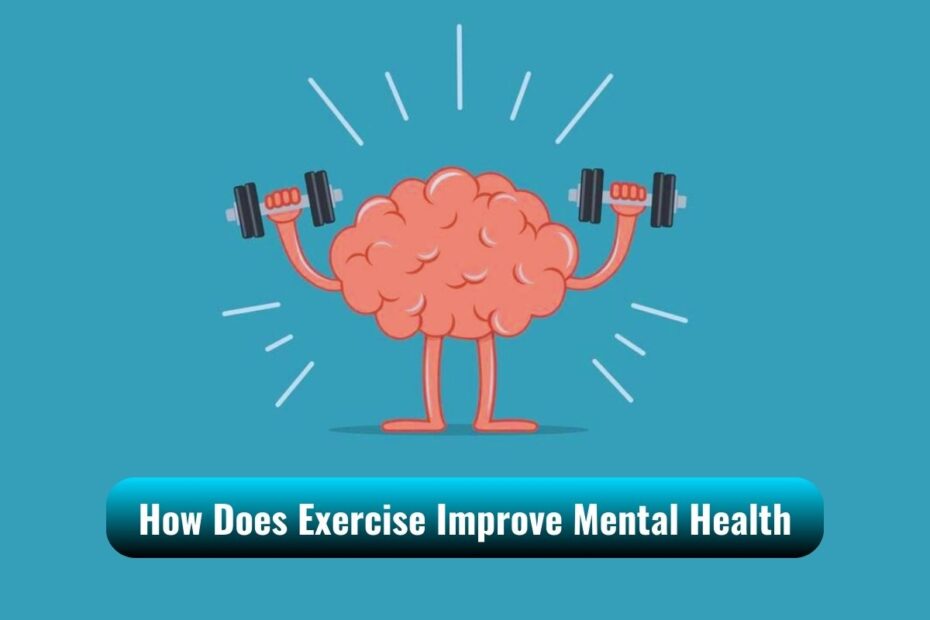You know, exercise is good for your mental and overall health. But did you know it can also improve mental health like your mood, improve your sleep, and help you deal with depression, anxiety, stress, and more?
Exercise can support you to regulate stress hormones and start the release of mood-bosting neurotransmitters. In this article, we’ll address how does exercise improves mental health.
How Does Exercise Improve Physical And Mental Health?
The physical exercise benefits are also essential for people with mental illness. It enhances your cardiovascular and overall physical health. It is important because people with mental health issues are at a higher risk of suffering from chronic physical situations like heart disease, diabetes, arthritis, and asthma.
Releases Neurotransmitters
Exercise helps in several essential chemical messengers called neurotransmitters are released throughout your nervous system.
Endorphins And Endocannabinoids
Endorphins and endocannabinoids are key neurotransmitters during exercise. While endorphins are well-known, endocannabinoids also have a significant impact on the brain during workouts.
Dopamine
Dopamine is a vital neurotransmitter linked to exercise. It influences pleasure and regulates heart rate, sleep, mood, attention, motivation, memory, learning, and pain processing.

Promotes Neuroplasticity
Exercise increases neuroplasticity, allowing the brain to adapt to stimuli. This helps in learning new skills, activities, and languages by enhancing signaling factors.
Increases Oxygen Supply To The Brain
Exercise boosts the oxygen supply to the brain by speeding up heart rate. It starts changes in brain blood vessels, potentially enhancing executive functions like working memory, flexible thinking, and self-control.
During exercise, neurotransmitters like endorphins, endocannabinoids, and dopamine are released. It also boosts neuroplasticity and oxygen supply to the brain.
How Does Exercise Improve Mental Health And Mood?
Regular exercise often feels good and can boost your mood, concentration, and alertness. It can help give you a positive outlook on life also.
The relationship between exercise and mental health is complex. But there are many reasons exercise can benefit your mental health, such as:
- The levels of chemicals in the brain, like serotonin, stress hormones, and endorphins, switch when you exercise.
- Regular exercise helps in better sleep and helps you manage your mood.
- Exercise can enhance your sense of control, coping ability, and self-esteem. Regular exercise often reports how good achieving a goal makes them feel.
- Exercise can distract from negative thoughts and provide opportunities.
- It offers an opportunity to socialize and get social support if you exercise with others.
- Exercise boosts energy levels.
- Physical activity can be a medium for your frustrations.
- Exercise can remove skeletal muscle tension and help you feel more relaxed.
How Do Diet And Exercise Improve Mental Health?
- Diet and exercise impact mental health, with rich in nutrients shown to improve depressive symptoms, per BMC Medicine.
- Food insecurity, concerning over 34 million in the US, worsens health outcomes and increases mental health risks, notes the USDA.
- Connecting patients with community resources like food banks can help food insecurity and improve well-being.
- Licensed clinical social workers (LCSWs) are important in addressing food insecurity and providing tailored care and support.
- Exercise contributes to overall well-being, complementing healthy diets for optimal mental and physical health.
How Does Exercise Improve Your Mental And Emotional Health?
- Regular exercise significantly reduces poor mental health days by over 40%, according to The Lancet Psychiatry.
- Physical activity acts as a potent coping mechanism, aiding stress management.
- It offers emotional release, boosts self-esteem and body image, and fosters a sense of achievement.
- Participating in activities like walking, jogging, or yoga helps combat negative thoughts and enhances mental resilience, per Frontiers in Psychology.
- Connecting communities with behavioral health specialists facilitates the adoption of regular exercise for improved mental health.

What Are The Mental Health Benefits of Exercise?
The mental health benefits of regular exercise are:
Can Relieve Stress
Regular exercise relieves stress by reducing cortisol and adrenaline. Studies show it improves resistance to stressors, potentially preventing stress. In a 2015 study, men who exercised were more resilient to acute stress. Exercise helps manage stress, improving the quality of lifestyle.
May improve self-confidence
Regular exercise boosts self-confidence by improving body image and self-compassion. Studies show regular exercise improves positive personal image. Being physically active is key to feeling good about your body and boosting self-esteem.
Can improve mood
Exercise can change mood by encouraging a positive outlook and reducing negative thoughts. Regular physical activity relates to improved mood and may help fight mild depression.
Can promote better sleep
Exercise can enhance sleep quality and may also reduce the time to fall asleep. Regular exercise suggests significant benefits for those struggling with sleep.
Tips for an exercise routine for mental health
Starting an exercise routine with a mental health condition needs consistency. Strategies for remaining motivated are essential. Here are the top tips for success:
- Find your ideal time of day
- Set attainable goals for staying motivated.
- Include exercises you enjoy.
- Work out with a friend or a group
- Work with a personal trainer
Read More: The Power of Positive Thinking: Boost Your Mental Health Today
Frequently Asked Questions [FAQs]
How does exercise impact mental health?
Regular exercise has a positive impact on mental health by improving mood, sleep, and cognitive function.
What neurotransmitters are released during exercise and how do they affect mood?
During exercise, neurotransmitters like endorphins, dopamine, and endocannabinoids are released, improving mood and relieving stress.
What are some tips for starting an exercise routine for mental health?
Tips for starting an exercise routine for mental health are finding your ideal time, setting attainable goals, enjoying activities, and seeking social support.
How does exercise complement traditional treatments for mental health conditions?
Exercise complements traditional treatments for mental health conditions by reducing symptoms, boosting mood, and improving overall well-being.
The Conclusion
Regular exercise is a promising complementary treatment for mental health conditions, alongside medications and psychotherapy.
Regular exercise releases brain hormones, reducing stress, boosting self-confidence, and improving mood, sleep, and cognitive function. A nutritious diet complements exercise for better mental health. Regular exercise and a balanced diet lead to improved mental health and overall well-being.

